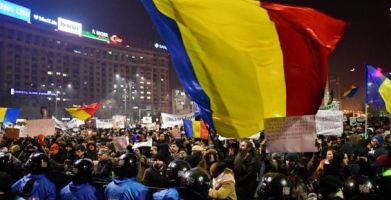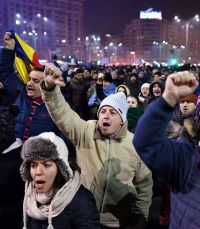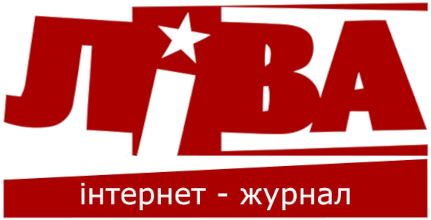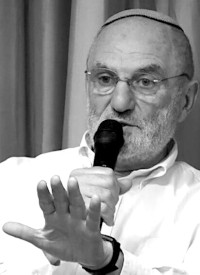
The events that have taken place in recent days in Romania have been assessed by observers in different ways. Some of them see a revolt of the Romanian middle class, who went out in the streets and whose mass protests forced the government to abandon the pardon of corrupt officials. Others, recognizing the impact of the protests, suggest that the Romanian oligarchs made concessions because of strong pressure from the European Union and the United States, and as a result the government in Bucharest will be more dependent and controlled.
Background to the political crisis
It all began with the scandalous initiative of the newly established Romanian coalition government led by the Social Democratic Party, which decided to annul criminal responsibility for officials convicted of corruption. The government hypocritically stated that this was due to the need relieve overcrowding in Romanian prisons. However, society viewed this decision as an attempt to rescue convicted corrupt officials from punishment, and even provide them an opportunity to occupy the highest public offices in the future. In recent years Romania adopted a series of anti-corruption laws which, in fact, resulted in the conviction for corruption of civil servants. Any official found guilty of bribery or theft of money from the budget no longer has the right to hold certain public offices. For this reason, the head of the ruling Social Democratic Party, Liviu Dragnea, could not become the head of the coalition government in which his party plays the role of maestro.
According to the government's decision, which was taken at an emergency meeting late in the evening of January 31, damage caused by corruption in the amount of less than 200,000 RON (around €42,000) should not be considered a criminal offense. This saved dozens of convicted politicians from criminal punishment – including Dragnea, who in 2015 was sentenced to two years’ probation for abuse of authority. An investigation found that two members of the Office of the Protection of Children “Teleorman” worked with his knowledge for the local branch of the Social Democratic Party, illegally getting paid. The damage from this scheme amounted to 108,000 RON. However, thanks to the government's decision, the leader of the Romanian Social Democrats received the right to stand again for the post of prime minister.
Largest mass protests since the fall of Ceausescu
This decision by the government caused Romania to explode. On the first day, late at night, when the media announced the government's decision, tens of thousands of people took to the streets. On the second day, February 1, at Victory Square in the center of Bucharest, there were about 200,000 protesters according to various estimates, but also about 100,000 protesters took to the streets of other Romanian cities. The protests took place without party symbols, although they were actively supported by the National Liberal Party and its member, Romanian President Klaus Iohannis. Protesters called the Social Democratic Party a "red plague". Active participants in the protests included fans of Romanian football clubs. They clashed with the police, who used tear gas and other non-lethal weapons against demonstrators. The next day it became clear that the police were engaged in provocations, and the fans were set against those of a football club, owned by one of Romanian oligarchs, supporting the government. Despite the clashes, the number of protesters has steadily increased, and soon they were called the most massive demonstrations in the last quarter of a century.
The liberal opposition and President Klaus Iohannis stepped up attempts to lead the protests – but not everyone liked it. However, by supporting the demands of the protesters and appealing to the Constitutional Court with a request to review the legality of decisions taken by the government, Johannis secured quite a lot of support. On the other hand, the effort to turn the action into a rally for the National Liberal Party did not succeed. Everyone was clear that such a brazen attempt to coopt the civic protest under the banner of their party would be met with hostility by protesters.
The government announced the cancellation of the scandalous decision on the fifth day of mounting protests. However, they continue even now – but now the main slogan of the protesters is to demand the resignation of the government.
Romania: a country under external management
From the outset, the protests have received active support from the EU bureaucracy. The Romanian government’s decision has been criticized by the European Parliament and the European Commission, and the U.S. Ambassador to Romania called the current Prime Minister Sorin Grindeanu to the carpet. These actions have allowed some analysts argue that the main reason for the cancellations of government’s decision was not the protests of Romanian citizens, but severe pressure from the outside.
We must admit that these assumptions are not without logic. In recent years, Romania has become a country that has completely lost sovereignty in foreign policy. Of all the Eastern European EU members, Romania most dutifully performed all the decisions of the European bureaucracy and the United States. This is proven by a wealth of evidence, including the scandal over secret CIA torture prisons, as well as the deployment of U.S. missile defense and U.S. military bases in the country. Romanian financial and political elites are willing to make any concessions to them so long as they are allowed to use the internal resources of the country for their own enrichment with impunity. In other words, the oligarchy that ruled the country for all these years was formed and strengthened with the direct connivance of the European Union and the United States. But in recent years transnational capital has intensified its struggle against the local oligarchs for redistribution of the economy, and therefore for the redistribution of political influence. And, judging by the results of protest, they have won.
Should we become Romanians?
At the same time, recent events in Romania have shown the power of massive popular protests – even though the allies of the demonstrators are transnational capital, European officials and a section of the local bourgeoisie. As it turned out, Romania has developed a rather strong and cohesive civil society. The non-partisan nature of the mass protests, consolidation of the middle class with today’s fairly marginal left intelligentsia circles, showed that in Romania there is something that reminds us of Iceland and Greece.
Will the Romanians be able to continue this massive popular resistance struggle against corruption, and extend it to the international financial institutions that for the last quarter century have conducted their experiments on this country? It remains to be seen. However, in contrast to neighboring Ukraine or Moldova, where the local oligarchs (who, incidentally, are on friendly terms with the Romanian ones) effectively divided their people, in Romania there was solidarity in the militant protest movement. And today, all of us should become a little Romanian. After all, for us in Moldova or in Ukraine, there are many reasons to join a popular protest against the oligarchs. But while Moldavians and Ukrainians are fighting with each other, the Romanians fight against the oligarchs. And, quite effectively.
Pavel Grigorchuk is a former Moldovan political prisoner, editor of the website Grenada.md, and activist of the leftist party "Red Bloc"
Translated by Greg Butterfield
-
Економіка
Уолл-стрит рассчитывает на прибыли от войны
Илай Клифтон Спрос растет>> -
Антифашизм
Комплекс Бандеры. Фашисты: история, функции, сети
Junge Welt Против ревизионизма>> -
Історія
«Красная скала». Камни истории и флаги войны
Андрій Манчук Создатели конфликта>> -
Пряма мова
«Пропаганда строится на двоемыслии»
Белла Рапопорт Феминизм слева>>













 RSS
RSS





